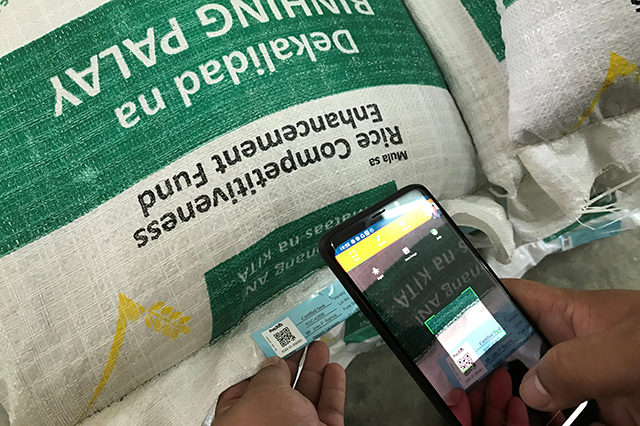
Farmers in two Aklan towns are grateful as they can now receive their seeds faster and easier through Binhi e-Padala, a digital voucher system used in distributing free certified inbred rice seeds from the Rice Competitiveness Enhancement Fund (RCEF) – Seed Program.
Through the Department of Agriculture – Philippine Rice Research Institute (DA-PhilRice) in Negros, Binhi e-Padala was recently launched in the towns of Ibajay and Makato.
NSIC Rc 216 and 480 were distributed to 174 rice farmers in Ibajay who received 277 bags and 172 farmers who received 254 bags.
Town officials said the system made the seed distribution faster and easier. Both towns were selected to launch the system because they have a high number of target farmer-beneficiaries and are active supporters of the digital system.
“Though this is new to us, community support made the launching easier,” Jinky Villarias, Makato municipal agriculturist, said.
Aklan Seed Growers Cooperative (ASGC) took charge of the seed distribution, syncing of farmer’s data to the national system, and informing farmers on the available varieties.
“The cooperative welcomes Binhi e-Padala that made the seed distribution faster because we directly input and sync farmer’s data. Payment process for the cooperative’s seeds was also quick,” Ann Lachica, Aklan Seed Grower Cooperative’s manager, said.
Merilyn Leonardo, 66, a recipient from Ibajay, Aklan said that the process shortened the time in claiming seeds.
“It only took me about 2 minutes to receive the seeds. I just presented the claim code to the person-in-charge of the distribution and got it [seeds] quickly. I am satisfied because I am allowed to select a variety that is available from the seed growers so I chose the NSIC Rc 216 variety, which is suitable to my field,” she said.
In the Binhi e-Padala system, PhilRice sends an SMS to a farmer’s validated mobile number indicating his/her name, allocation, pick-up point, and assigned schedule. Farmers may select at least three preferred varieties based on recommended national and regional varieties. The system directly informs the farmers about the schedule of seed distribution so they don’t need to travel back and forth just to check their schedules.
Despite difficulties because of the unstable internet signal in his area, Joven Seville, Ibajay municipal agriculturist, said that the system’s overall process is smooth and effective.
Rojen Austria, RCEF coordinator, said that to lessen the trouble caused by weak internet signal, they will try to distribute the seeds in the morning, distribute in areas with stronger internet signal, or add more personnel from the seed growers to input and sync data.
The system will soon be adopted by other LGUs in Aklan and other provinces covered by RCEF-Seed Program.
The RCEF-Seed Program is a component of Republic Act 11203 or Rice Tariffication Law signed by Pres. Rodrigo Duterte, which allots P10 billion fund every year for the rice farmers. Sponsored by Sen. Cynthia Villar, the program is a six-year government initiative to help the farmers compete in the international rice market. The local government units and lawmakers assist in its implementation.
PhilRice leads the RCEF-Seed Program and is the government’s lead agency on rice research and development mandated to help ensure a rice-secure Philippines. With eight stations across the country, its programs and projects are in line with the DA’s “Masaganang Ani, Mataas na Kita” battle cry.




